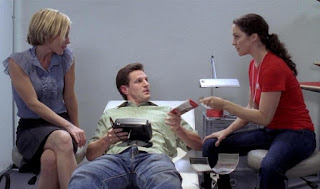
TiMER
(R)
Written and Directed by Jac Schaeffer
Running Time: 99 minutes
Originally Released: April 26, 2009 (Tribeca Film Festival)
* * ½ (out of four)
(R)
Written and Directed by Jac Schaeffer
Running Time: 99 minutes
Originally Released: April 26, 2009 (Tribeca Film Festival)
* * ½ (out of four)
Low budgets can be a double-edged sword in the world of cinema. On the one hand, low budget films can feel more authentic—the casts are largely unfamiliar, the cinematography is down-to-earth, and the script is unadulterated by studio moguls who insist on molding the film into something with commercial viability, which usually entails making the film more clichéd. On the other hand, these very same elements can sometimes give low budget films a very made-for-TV feel. TiMER vacillates between the good and bad of independent film, ultimately providing a charming and quirky, if not amateurish, romantic comedy.
Weeks shy of hitting the big 3-0, orthodontist Oona O’Leary (Emma Caulfield) wants desperately what everyone else seems already to have. No, not love—just a date. No, not that kind of date. Just the date—the month, day, and year—when she will meet her one true love. Oona’s request is not so outrageous, for this is precisely what is promised to those who pay the $79.99 fee to have a Timer-brand timer implanted in the wrist of their dominant hand. Timer, the company, is eHarmony with a sci-fi bent, the overwhelming majority of Americans having a Timer-brand timer installed in their wrists when they turn 14. The timer displays a countdown to the very day when its owner will meet his or her soulmate, at which point the timer “zeroes out,” thereafter to beep in confirmation only when the paired soulmates make eye contact for the very first time. There is one catch, however. A timer will not display a countdown unless one’s soulmate also has a timer installed. This explains Oona’s frustrations—her timer has never displayed a countdown, though not for want of trying. When Oona meets an eligible bachelor who has never had a timer installed, she immediately drags him to the nearest Timer store and has the device implanted, hoping it will zero out immediately and thereby signal that she has found her one. So far, this has proven fruitless, save that the Timer store employees know her by name and she can quickly summarize the waiver her prospective suitors must sign before having their timers installed.
On the opposite end of the spectrum is Oona’s half-sister, Steph (Michelle Borth), whose timer tells her that true love is decades away. The film raises the question of which is worse, knowing that true love is a long way off or not knowing when it will come at all. Steph is clearly disenchanted by her timer, though she does her best to console herself with a series of frivolous one-night-stands. And then there is Mikey (John Patrick Amedori), the cute, young grocery store cashier and drummer whose timer displays a modest four-month wait until true love comes knocking. This doesn’t stop Mikey from flirting with Oona, however, who finds herself wondering if a momentary fling is better than nothing at all.
 TiMER is replete with interesting philosophical puzzles. Is it cheating to date someone when you know your soulmate is someone else, whom you’ll be meeting in the relatively near future? Can a romantic relationship have value if you believe it is ultimately doomed? Is it better to know love is a long way off than not to know at all? (We still haven’t answered that one!) TiMER lets these questions percolate naturally, which is a plus. The movie never feels too enamored of its own creativity or cleverness, and this is precisely what makes it such a delight. Its intelligence is subtle, couched in a straightforward romantic comedy with universal appeal.
TiMER is replete with interesting philosophical puzzles. Is it cheating to date someone when you know your soulmate is someone else, whom you’ll be meeting in the relatively near future? Can a romantic relationship have value if you believe it is ultimately doomed? Is it better to know love is a long way off than not to know at all? (We still haven’t answered that one!) TiMER lets these questions percolate naturally, which is a plus. The movie never feels too enamored of its own creativity or cleverness, and this is precisely what makes it such a delight. Its intelligence is subtle, couched in a straightforward romantic comedy with universal appeal.That being said, TiMER is not without flaws. If writer/director Jac Schaeffer is ever guilty of trying too hard, it is in the film’s more serious moments. When trying to create tension on the screen, Schaeffer opts for edgy handheld cameras and profane outbursts from her characters; these are familiar cinematic devices, but there is something conspicuously deliberate about Schaeffer’s implementation of them. They can make TiMER feel more like a film school project than Schaeffer probably intends. Further fault lies with the actors themselves. Caulfield and Borth both have a tendency to deliver lines in a memorized fashion, making some interactions between them feel particularly scripted, especially early in the film. One can’t help but wonder if Caulfield, whose credits include extensive runs on TV’s Beverly Hills, 90210 and Buffy the Vampire Slayer, was the right choice for the lead role. Even at her best, Caulfield isn’t irreplaceable, and it admittedly takes a hefty suspension of disbelief to accept that Oona is only 29 years old. The latter complaint may be petty, but the occasionally awkward acting is not. Fortunately, Caulfield’s (and Borth’s) performance is often buoyed by the actors surrounding her, especially Amedori. Amedori’s ease in front of the camera is a bright spot of the film, and Amedori himself proves to be one exception to TiMER’s apparent rule that the smaller the role, the better the acting.
For all its weaknesses, TiMER is probably a much better film than it would be had it been given a Hollywood makeover. It is easy enough to envision this picture with the likes of Jennifer Garner in the lead, but I shudder to think of how dumbed down and gimmicky it would have become. Schaeffer, who proves a better screenwriter than director, instills TiMER with a subtle realism that allows its plot to remain thought-provoking and its characters sincere, even when it otherwise stumbles. Hollywood would have glossed things up a bit, but only at the expense of whatever depth TiMER has to offer. As it is, I’d much rather spend my time here than in Hollywood.

Interesting idea for a movie. I once asked a friend if she knew she wouldn't be married until a certain age but she met someone in the mean time and knew he wouldn't be the one but really liked him anyway, would she pursue the current relationship. I still feel like I don't know what to think. I think I didn't really date in high school because it didn't feel right. I wanted to be in love not just go to prom etc. In that way, I think I kinda missed out. But my sincerity wouldn't let me just relax and have fun with it. Hm. What does everybody else think?
ReplyDeleteThat's what I think is so fascinating -- the fact that I almost would feel unfaithful dating someone with the belief that they couldn't possibly be the one (while also believing there is a one, somewhere). Of course, you have to date to find out if someone could be the one -- but if you really didn't think they were, wouldn't it feel kind of dishonest somehow?
ReplyDeleteIt's interesting what you say about high school. I don't remember the specifics of what was said, but I do remember friends once telling me that I should be dating more and that I would regret not doing so. Somewhat gleefully, I look back and realize they were wrong. I really don't regret not dating more. I personally hate the idea. Seriously, it makes me feel stupid and uncomfortable, but maybe that's because I am too shy in the first place. I don't know. Maybe I'm not remembering things as accurately as I should, but I don't feel like I overly enjoyed the dates I went on. They all felt somewhat uncomfortable and unnatural. Save for those with my then-future, now-now wife, which honestly never felt awkward. I couldn't be happier that dating--dating people I don't know very well, I mean--is over. On the other hand, I sure wish Melanie and I went on more dates nowadays than we do...